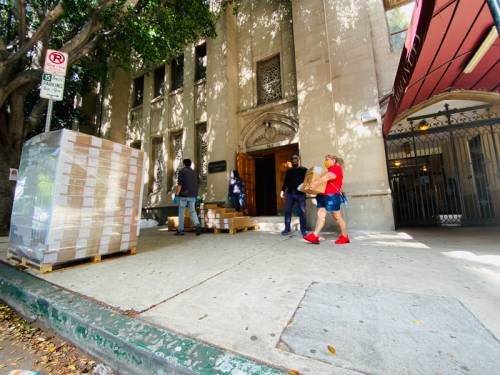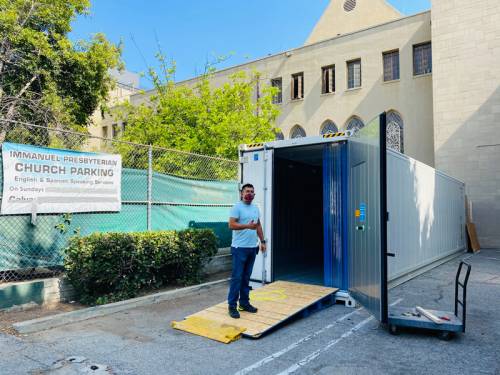Immanuel one of several Pacific Presbytery churches meeting growing need with support from Presbyterian Hunger Program, Disaster Assistance
by Rich Copley | Presbyterian News Service

The Westminster Chapel at Immanuel Presbyterian Church in Los Angeles has been transformed into a food storage facility to meet increasing demand due to COVID-19. (Photo by MarAnthony Aparicio)
LEXINGTON, Kentucky — As June turned to July, Immanuel Presbyterian Church in Los Angeles needed a place to store food.
Its direct food service to people in need had skyrocketed from 120 households a week before the COVID-19 pandemic to more than 2,000 a week as the virus staged a resurgence in California that has resulted in it being the state with the most coronavirus infections in the country. Immanuel, in L.A.’s Mid-Wilshire/Koreatown area, was running out of space to keep food – at one point jerry-rigging cooling ducts in a hallway to create improvised, temporary cold storage. Then church leaders cast their eyes on its Westminster Chapel.
Immanuel’s Session expressed openness to making it a storage space before, and the morning of July 3 it approved removing the pews.
“By 4 o’clock that afternoon, half the pews were gone,” transitional co-pastor the Rev. Andrew Schweibert said. “It was like, ‘Boom! Move it.’ By Monday, they were all gone.”
The church also had electrical outlets in the chapel converted to accommodate the needs of refrigerator equipment, and has made other modifications to the facility so that it can help the community experiencing health and economic calamities from the coronavirus that have been particularly hard on Southern California.
“We are all-in right now, all-in,” Schweibert said.
Immanuel has been all-in since the early days of the pandemic. Watch a video on the church’s ministry to hungry people here.
In an application for a Congregational Emergency Food Grant from the Presbyterian Hunger Program (PHP), the church detailed its direct food service going from one morning a week, serving around 120 families, to six days a week, serving 1,700. In addition to regular clientele —primarily of people who were homeless, low-income, immigrant, and elderly — the church was seeing more people who were gainfully employed just a few weeks before the pandemic took hold. Most households being served were between four and nine people.
The church relied on numerous local partnerships to keep its food pantry going through the influx of need.
It’s a situation that is replicated in a handful of churches around the Los Angeles area: Congregations that were serving a few hundred people with their food programs were now faced with more than 1,000 people in need.

People receive food outside Immanuel Presbyterian in Los Angeles, where bulk shipments of food arrive regularly. (Photo by MarAnthony Aparicio)
“It’s people who have never stood in food lines before,” said the Rev. Heidi Worthen Gamble, mission catalyst and hunger action advocate for the Presbytery of the Pacific. “It’s heartbreaking. It’s devastating.”
In May, the presbytery held a virtual concert that raised more than $10,000 to address hunger in the area. Worthen Gamble says the presbytery and churches have actively sought support in numerous ways to address the overwhelming need in Southern California. Immanuel Operations Director Virginia Beaboa said there have been days during the crisis they did not know where food would come from for the next day — and then an unexpected donation came through.
The Presbyterian Hunger Program grant helped supplement the local donations and partners.
“The work that congregations are doing to feed and house people is so important, especially now,” said Andrew Kang Bartlett, PHP Associate for National Hunger Concerns.
It takes numerous volunteers to keep the pantry at Immanuel Presbyterian Church going. Volunteers load up reusable tote bags with content including fresh produce.
“We all have to practice social distancing,” Schweibert said. “The staff and volunteers know the risks, but they see this as an essential service. They are choosing to be here and work, and work as volunteers.”
Immanuel is partnering with other churches in Presbytery of the Pacific’s Homelessness and Housing Task Force, including Hope on Union, Wilshire, St. Mark’s, First Hollywood, Calvary Hawthorne, and Bel Vue Presbyterian to share resources in the area. Worthen Gamble said that finding volunteers can be a challenge for churches with older congregations more vulnerable to COVID-19 or in lower-income areas where the majority of members work multiple jobs to make ends meet. A number of those workers have also contracted coronavirus, she notes.

A cold storage unit sits outside Immanuel Presbyterian Church in Los Angeles to preserve perishable items it distributes to the community. (Photo by MarAnthony Aparicio)
Another challenge is moving food between churches and accessing potential supplies. One of the things Worthen Gamble said would be extremely helpful is a refrigerated truck because “we are carrying perishable items, and one thing COVID has not stopped is the legendary L.A. traffic.” The presbytery, she and Schweibert said, has gotten by through borrowing and renting trucks. But buying one could really increase their capacity to obtain and distribute food.
In addition to an earlier emergency grant to support the food pantry, the Presbytery recently received a Presbyterian Disaster Assistance (PDA) grant to support the purchase of a truck that Worthen Gamble says has put it closer to that goal, though additional funds are needed.
“One of the marks of a Matthew 25 church is feeding those who are hungry,” said the Rev. Jim Kirk, Associate for Disaster Response (U.S.) with PDA. “As the numbers of positive test results continue to climb, the numbers of those who are hungry will continue to climb. … It is impressive to see the way the Presbytery of the Pacific is facilitating a collaborative approach to enhance food security. The efforts of the presbytery will make a long-term impact for those so severely impacted by the pandemic.”

the Rev. Andrew Schweibert
In the long term, Schweibert said Immanuel hopes to get back to its plans before the pandemic hit: to transition to long-term work with people in need to address issues such as employment and housing.
“As more people are hurt by the economic downturn, access to affordable housing will be critical to keeping the number of unhoused people low,” Kang Bartlett of PHP said. “So, we are grateful for the PC(USA) congregations that participate in Congregation-Based Community Organizing coalitions, which are advocating for affordable housing around the country.”
Schweibert and Worthen Gamble both said they are concerned about what will happen when moratoriums on evictions and rent collection are lifted.

the Rev. Heidi Worthen Gamble
“Unless something comes around to provide rent help, we’re looking at a huge disaster toward the end of the year,” Worthen Gamble said. “We’re also really looking for ways we can help churches build more infrastructure for what will be enormous demand.”
Schweibert said, “We’re looking at having our food time as a time to help people get connected to services that can help them find housing. We want to build relationships that last and help the neighborhood and the community.”
Support the work of the Presbyterian Hunger Program and Presbyterian Disaster Assistance by giving to One Great Hour of Sharing.
Read more
At many churches, homeless ministries continue during pandemic
![]() You may freely reuse and distribute this article in its entirety for non-commercial purposes in any medium. Please include author attribution, photography credits, and a link to the original article. This work is licensed under a Creative Commons Attribution-NonCommercial-NoDeratives 4.0 International License.
You may freely reuse and distribute this article in its entirety for non-commercial purposes in any medium. Please include author attribution, photography credits, and a link to the original article. This work is licensed under a Creative Commons Attribution-NonCommercial-NoDeratives 4.0 International License.
Categories: Disaster Response, Hunger & Poverty, Matthew 25, Peace & Justice, Special Offerings
Tags: andrew kang bartlett, bel vue presbyterian church, calvary hawthorne presbyterian church, coronavirus, covid-19, first hollywood presbyterian church, hope on union, hunger and poverty, immanuel presbyterian church los angeles, jim kirk, matthew 25 church, One Great Hour of Sharing, presbyterian disaster assistance, presbyterian hunger program, presbytery of the pacific, rev, rev. andrew schweibert, rev. heidi worthen gamble, st. mark's presbyterian church los angeles
Ministries: Presbyterian Hunger Program, Compassion, Peace and Justice, Presbyterian Disaster Assistance, Matthew 25 in the PC(USA): Join the Movement